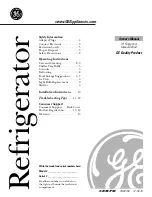
2
IMPORTANT SAFETY INFORMATION
It is most important that this instruction book should be retained with the appliance for future refer-
ence. Should the appliance be sold or transferred to another owner, or should you move house and
leave the appliance, always ensure that the book is left with the appliance in order that the new owner
can get to know the functioning of the appliance and the relevant safety information.
This information has been provided in the interest of safety. You MUST read it carefully before
installing or using the appliance.
Installation
•
This appliance is heavy. Care should be taken
when moving it.
•
It is dangerous to alter the specifications or attempt
to modify this product in any way.
•
Care must be taken to ensure that the appliance
does not stand on the electrical supply cable.
Important:
if the supply cable is damaged, it must
be replaced by a special cable available from the
manufacturer or its service agent.
•
Any electrical work required to install this appliance
should be carried out by a qualified electrician or
competent person.
•
Parts which heat up should not be exposed.
Whenever possible, the back of the appliance
should be close to a wall but leaving the required
distance for ventilation as stated in the installation
instructions.
•
The appliance should be left for 2 hours after instal-
lation before it is turned on, in order to allow the
refrigerant to settle.
Child Safety
•
Do not allow children to tamper with the controls or
play with the product.
•
Keep all packaging well away from children.
General Safety
•
Take utmost care when handling your appliance
so as not to cause any damages to the cooling
unit with consequent possible fluid leakages.
•
The appliance must not be located close to radi-
ators or boilers.
•
Avoid prolonged exposure of the appliance to
direct sunlight.
•
Do not use other electrical appliances (such as
ice cream makers) inside of refrigerating appli-
ances, unless they are approved for this pur-
pose by the manufacturer.
During Use
•
This appliance is designed for domestic use only,
specifically for the storage of edible foodstuffs only.
•
Frozen food must NOT be re-frozen once it has
thawed out.
•
Do not place carbonated or fizzy drinks in the
freezer.
•
Do not remove items from the freezer if your
hands are damp/wet, as this could cause skin
abrasions or frost/freezer burns.
•
Ice lollies can cause ‘frost/freezer burns’ if con-
sumed straight from the freezer.
•
Manufacturers’ storage recommendations should
be strictly adhered to. Refer to relevant instruc-
tions.
•
The cooling plate or refrigerated freezer shelves
in this appliance contain channels through which
the refrigerant passes. If these are punctured this
will cause substantial damage to the appliance
and result in food loss. DO NOT USE SHARP
INSTRUMENTS to scrape off frost or ice. Under
NO circumstances should solid ice be forced off
the lining or shelves. Solid ice should be allowed
to thaw, when defrosting the appliance. See
Defrost Instructions.
Maintenance and Cleaning
•
Switch off and unplug the appliance before carry-
ing out any cleaning or maintenance work.
Servicing
•
This product should be serviced by an authorised
engineer and only genuine spare parts should be
used.
•
Under no circumstances should you attempt to
repair the machine yourself. Repairs carried out
by inexperienced persons may cause injury or
serious malfunctioning. Refer to your local
Electrolux Service Force Centre and always
insist on genuine spare parts.
At the end of the
Appliance Life
•
When disposing of your appliance, use an autho-
rised disposal site.
•
Remove the plug and ensure that any locks or
catches are removed, to prevent young children
being trapped inside.




























